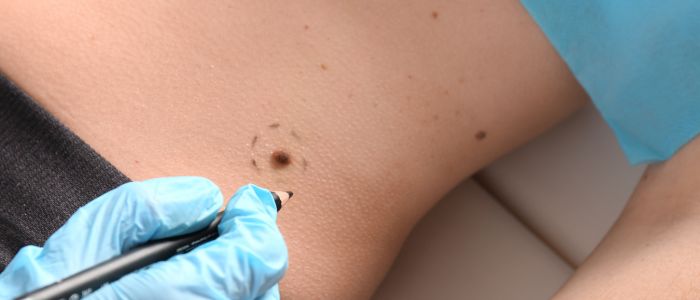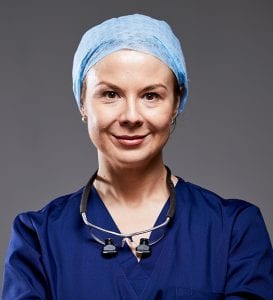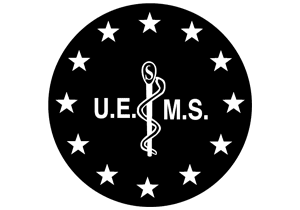
This may be a small patch of darkened tissue that is irregular in shape, and may or may not be raised from the surface of the skin.
Skin irregularities can appear for any number of reasons, including: genetics, side effects of medication, sun exposure, infection, viruses or systemic diseases. Many skin lesions are present at birth (such as birth marks), whereas others may develop over time, with some progressing from a primary lesion to a secondary lesion through aggravation.
For many people their first thought may be that it’s skin cancer, which may or may not be the case. The truth is that until an usual or new skin lesion is investigated, we can not be sure.
Table of Contents
- How will I know if I have skin cancer?
- Are moles skin cancer?
- What is skin cancer or mole surgery?
- Skin Cancer and Mole Surgery at Chester Cosmetic Surgery
- Types of Skin Cancer
- The Importance of Regular Mole Checks
- Surgical Options for Mole and Skin Cancer Removal
- Patient Journey: Before, During, and After Surgery
- FAQs about Skin Cancer and Mole Surgery
- Further Reading about Skin Cancer with Consultant Plastic Surgeon Anca Breahna
How will I know if I have skin cancer?
In many cases a lump, bump or lesion is harmless, in others, it can be an indication of skin cancer. Skin cancer is the most common form of cancer and can develop on any part of the face or body. However, as sun exposure is one of the main causes, it is most likely to appear in places that are largely left uncovered.
Skin cancer develops when the DNA in skin cells starts to mutate, or become abnormal. These mutations can get out of control and accumulate to form a mass on cancerous cells. This mass will usually affect the top layers of the skin (the epidermis) which contain 3 types of cells: melanocytes (which produce melanin to give the skin its colour), squamous cells (acting as the skin’s lining) and basal cells (which produce new skin cells). These are the most common places for cancerous cells to develop, and are the 3 most common forms of skin cancer – squamous cell skin cancer, basal cell skin cancer and malignant melanoma. With these types of cancer a noticeable bump or lesion can form. This may be a different tone and texture to the surrounding skin, and may get larger or more irregular in shape.
The best way to know if a lesion is cancerous will be to visit a doctor and have it examined using specialist equipment, as well as taking photos. The doctor will be able to make a diagnosis and suggest the best form of treatment. Gels and creams can be used in some cases, however, a biopsy is often recommended.
Are moles skin cancer?
There are a vast amount of people who have moles or freckles on their body. Some people have very few, whereas others can have many. They can range in size and shape and may rise from the skin’s surface. Moles are also known as nevi and are a type of skin growth that develop from an accumulation of pigment-forming cells – melanocytes. They can change in size and tone over time, but if a person notices they have developed an irregular border or appear in a range of shades they will need to get it checked. At this stage doctors can not guarantee the mole is cancerous but an examination will determine the degree of abnormality, and a biopsy will be arranged.
What is skin cancer or mole surgery?
When removing an abnormal mole, an excision procedure will cut around the lesion in an ellipse shape. This enables a certain amount of skin and tissue to be removed from around the mole (internally and externally) in case the cancerous cells have started to spread. The mole will then need to be sent away for testing to see if it actually is cancerous, and if further treatment is needed. Whether the mole is or isn’t cancerous the doctor will want to see the patient at a follow-up appointment which may involve checking any other moles on the body in case they too, are appearing to be abnormal.
Skin Cancer and Mole Surgery at Chester Cosmetic Surgery
Skin cancer is a prevalent health concern worldwide, and early detection and treatment are crucial for successful outcomes. At Chester Cosmetic Surgery, we specialise in diagnosing and treating various skin lesions, offering state-of-the-art care for our patients.
Types of Skin Cancer
Skin cancer can manifest in various forms, with the three most common being basal cell carcinoma (BCC), squamous cell carcinoma (SCC), and malignant melanoma. Each type originates from different cells within the skin and requires specific approaches for treatment.
- Basal Cell Carcinoma (BCC): Often developing in sun-exposed areas of the body, BCCs are highly treatable and seldom spread to other parts of the body. However, they can be disfiguring if not addressed promptly.
- Squamous Cell Carcinoma (SCC): More aggressive than BCC, SCC can spread to other body parts if neglected. Early detection significantly improves the prognosis.
- Malignant Melanoma: The most severe form of skin cancer, melanoma, is known for its ability to spread rapidly. Early detection and treatment are vital for survival.
The Importance of Regular Mole Checks
Regular mole checks are vital for early detection of skin cancer. Moles should be checked for any changes in size, shape, colour, or texture. The ABCDE rule (Asymmetry, Border, Colour, Diameter, Evolving) is a helpful guide to assessing moles. Any noticeable changes should prompt a consultation with a healthcare professional.
Surgical Options for Mole and Skin Cancer Removal
At Chester Cosmetic Surgery, we provide several surgical options tailored to the type and stage of skin cancer or mole.
- Excisional Surgery: This common method involves cutting out the cancerous tissue and a surrounding margin of healthy skin as a precautionary measure.
- Cryosurgery: Using liquid nitrogen, this treatment freezes and destroys abnormal cells. It’s often used for pre-cancerous conditions and small skin cancers.
Patient Journey: Before, During, and After Surgery
Patients at Chester Cosmetic Surgery can expect a thorough and empathetic approach throughout their treatment journey.
- Before Surgery: Consultation involves detailed discussions about your medical history, a physical examination of the skin, and preparation instructions for surgery.
- During Surgery: Procedures are performed under local anaesthesia in our state-of-the-art facilities, focusing on maximising your comfort and minimising downtime.
- After Surgery: Follow-up care is critical. We provide detailed instructions for postoperative care, signs of complications to watch for, and scheduled follow-up visits to monitor recovery.
Education plays an important role in the treatment of skin cancer. We offer resources and support for our patients to understand their condition, manage their treatment, and make informed decisions about their health. Our team is committed to providing continuous education on skin health maintenance and the prevention of skin cancer.
FAQs about Skin Cancer and Mole Surgery

How often should I have my skin checked by a professional?
Regular professional skin checks are recommended at least once a year, or more frequently if you have a history of skin cancer or are at high risk due to factors like a fair complexion or extensive sun exposure.
What can I expect in terms of scarring after mole or skin cancer surgery?
Scarring can vary based on the surgery type, location on the body, and individual healing characteristics. Consultant Plastic Surgeon Anca Breahna will discuss scar minimisation techniques and what to expect specifically for your situation.
Are there any non-surgical treatments available for skin cancer?
Non-surgical options may include topical medications, radiation therapy, or photodynamic therapy, depending on the cancer type and stage. These treatments are generally considered for specific cases where surgery is not an option.
How can I best prepare for surgery to remove a mole or skin cancer?
Preparing for surgery usually involves avoiding certain medications that can increase bleeding, not smoking, and arranging for someone to drive you home post-surgery. Your surgical team will provide a detailed list of pre-operative instructions.
What follow-up care is necessary after mole or skin cancer surgery?
Follow-up care includes wound care, monitoring for signs of infection or complications, and regular follow-up appointments to check for any recurrence of skin cancer and overall skin health.
Where can I have skin cancer or mole surgery?
Chester Cosmetic Surgery in Chester provides surgical excision procedures to help remove cancerous cells / abnormal moles. Miss Breahna will require patients to make an appointment for consultation to examine any concerning lesions before a suitable plan of action is recommended.
Further Reading about Skin Cancer with Consultant Plastic Surgeon Anca Breahna
- Read Anca’s Blog about Treatments and Solutions for Skin Moles
- Read Anca’s Blog about Treatments and Solutions for Skin Cancer






